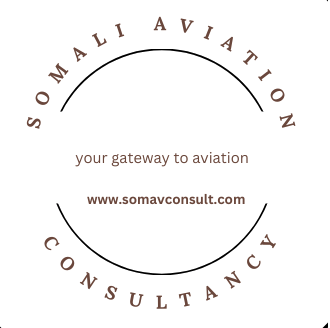Somalia’s aviation sector holds significant potential for growth and development, with increasing demand for aircraft registration under Somali jurisdiction. However, the Somali Civil Aviation Authority (SCAA) faces challenges in effectively registering and managing aircraft due to limited expertise, staffing, and resources. To address these challenges and capitalize on emerging opportunities, new policies for aircraft registration are essential.
Policy Objectives:
- Enhancing Expertise: Develop capacity-building programs to equip SCAA personnel with the necessary skills and knowledge to effectively manage aircraft registration processes.
- Streamlining Procedures: Implement efficient and transparent registration procedures that align with international standards, reducing administrative burdens and processing times.
- Ensuring Compliance: Strengthen regulatory oversight to ensure compliance with international aviation regulations, safety standards, and legal requirements for registered aircraft.
- Promoting Investment: Create a conducive regulatory environment to attract investment in the Somali aviation sector, encouraging airlines and aircraft owners to register their assets under Somali jurisdiction.
- Facilitating Growth: Support the expansion of the Somali aircraft registry to meet the growing demand for registration services, fostering economic development and global connectivity.
Policy Framework:
- Capacity Building: Establish training programs in collaboration with international aviation authorities and industry experts to enhance the expertise of SCAA personnel in aircraft registration, airworthiness certification, and regulatory compliance.
- Modernization of Processes: Introduce electronic registration systems and digital platforms to streamline registration procedures, improve data management, and enhance accessibility for stakeholders.
- Quality Assurance: Implement rigorous quality assurance mechanisms to ensure the accuracy and integrity of registration records, including regular audits and inspections of registered aircraft.
- Partnerships and Collaboration: Forge partnerships with reputable international aviation organizations, legal experts, and technical service providers to leverage their expertise and resources in enhancing the efficiency and effectiveness of aircraft registration processes.
- Incentives for Registration: Offer incentives such as favorable tax policies, reduced registration fees, and expedited processing for aircraft registered under Somali jurisdiction, incentivizing airlines and aircraft owners to choose Somali registration.
- Public Awareness and Outreach: Launch awareness campaigns to promote the benefits of Somali aircraft registration among airlines, leasing companies, and aircraft operators worldwide, highlighting the advantages of registering under Somali jurisdiction.
Conclusion: The development of comprehensive and effective aircraft registration policies is crucial to positioning Somalia as a competitive player in the global aviation industry. By investing in capacity building, modernizing registration processes, ensuring compliance, and fostering collaboration, Somalia can unlock the full potential of its aircraft registry, driving economic growth, and enhancing its reputation as a reliable and attractive jurisdiction for aircraft registration.
